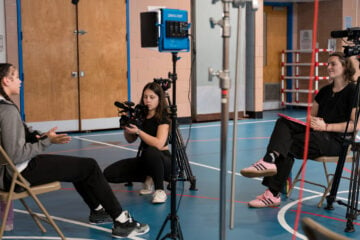Maine Public addresses ‘new urgency’ with video newscasts created for immigrants

Maine Public
Abdi Nor Iftin delivers a Maine Public newscast in Somali.
As a wave of refugees seeking asylum has flooded its state, Maine Public has launched a program offering weekly video newscasts in four languages to an increasingly diverse population.
The station began broadcasting translations of news stories in French, Spanish, Somali and Portuguese last April. The newscasts have generated a total of 33,000 views, averaging about 1,500 a week.
Just two months after creating Maine Public Connecting Communities, the station took another step in engaging immigrants, refugees and asylum seekers across the state by hiring a reporter to focus on them. The new position, based at the station, is partially funded by Report for America, the nonprofit initiative that provides financial support for hiring journalists in newsrooms across the country.
“We thought, wouldn’t it be great if in addition to giving these communities news and information in their pipeline, we start to cover these communities so they can hear about themselves?” said Mark Simpson, Maine Public’s director of news and public affairs. “So we have better coverage of these communities for these communities.”
The immigrants changing Maine
Maine has long been ranked as the country’s whitest state, but that began to change over the past decade as the white population dropped from 95% to 91%, according to the 2020 census.
At Maine Public, news executives began noticing an influx of refugees from Angola and the Democratic Republic of the Congo arriving in Portland beginning in 2019. The immigrants had fled their countries for South America, crossed the border in Mexico and then boarded buses headed for Maine.
Most were asylum seekers who were attracted to Portland because others had arrived before them. “It’s similar to other migrant patterns — once a community moves here and they feel safe and supported here, they feel welcome,” said Julia Trujillo, director of Portland’s Office of Economic Opportunity.
In Portland, asylum seekers were provided with food and temporary housing regardless of their status, with 500 refugees who have been placed in local hotels this year, Trujillo said. While some of the refugees speak English, the native language for those from Congo is French, and for those from Angola, Portuguese.
The arrival of the refugees coincided with the onset of the pandemic, which prompted Maine Public to explore new ways of communicating with the newly transplanted residents and with existing immigrant groups, including a growing population of Somalis and residents from Mexico and South America.
“Maine Public wanted to help however it could with the tools it had,” Simpson said. “When the pandemic hit, it suddenly had a new urgency to try and get public service news and information out.”
Creating a translation team
The station decided to offer translations of its news broadcasts in the most commonly spoken languages in the state, after English. Four translators, all native speakers of the languages, were hired to record a series of newscasts each week in video format.
“For us to jump in and tackle four languages at one time was a big lift,” Simpson said. “There were lots of other languages that people hoped for, but you have to try to assess what’s the population and what’s the demand.”
After the newscasts are produced for the project, Maine Public distributes the videos to a group of government and social service agencies, which then emails them to members of immigrant communities across the state.
“The information is only useful if it reaches the right eyes and ears,” said Madeleine Saucier, program and community engagement manager at Maine Immigrants’ Rights Coalition, which sends out the videos to an email list of 400 people each week. “It doesn’t serve a purpose if I’m watching it.”
With an operating budget of about $100,000, the project has received support from a number of small foundations and local businesses. In addition, a one-day pledge drive held in March generated $115,000 from more than 700 donors, Simpson said.
To increase engagement in the community, the station also used a $20,000 grant from America Amplified, a CPB initiative, to translate its newsletter into the four languages and expand diversity, equity and inclusion efforts in the newsroom, including tracking source diversity in news coverage.
Adding to newsroom staff
Beyond translating the news, Maine Public expanded its coverage of the state’s immigrant communities when it hired Ari Snider, a public radio journalist who happens to speak Portuguese. His salary is being partially subsidized by Report for America.
The stories Snider has produced include a soccer match between players from Burundi and Rwanda, the challenge of trying to find housing in Maine and the election of a Somali American as mayor in South Portland.
“These are people whose communities are growing and who are really helping to change the face of Maine,” Simpson said. “So it’s really important for us as a news and public service organization to be there on the front lines.”
Not only does Snider report on the immigrant communities, but he also selects the stories to include in the video newscasts each week. “Ari is really embedded in these communities, so he has a keen eye about which stories should be included,” said Cory Morrissey, Maine Public’s chief business officer.
Viewers of the video newscasts want to hear stories about their own communities, but they also want to learn about activities that teach them about American holidays and customs, said Tracy Moore, coordinator of services to older refugees at Catholic Charities Maine.
“It’s very helpful for them to know about local events because it helps them understand and feel connected to their local community,” Moore said. “It gives them something to talk about with other people and their American neighbors, and it gives them something they can practice speaking English about.”
Planning for the future
As the station assesses the future of the project, several community leaders have asked that Arabic be added to the mix of translated news to serve immigrants from Iraq, Syria and Lebanon.
The station is considering adding a text-only newsletter of translated news that would include Arabic for a trial period. “We are at capacity for now for the video newscasts, though that’s subject to change,” said Miles Brautigam, program coordinator of the project.
In addition to emailing the newscasts every week, Trujillo said she hopes the videos can be incorporated into English classes immigrants take and the all-day cultural orientation that Portland offers to newcomers but is now on hold because of the pandemic. “There are opportunities that could take place,” she said. “It’s just right now is a little bit of a transitional time.”
Maine Public plans to meet with community leaders to determine next steps for the project. The station hopes to continue expanding Connecting Communities now that it has widespread community support, Simpson said.
“The more that gets added into the project, the greater the momentum is,” he said. “What started as a simple ‘Let’s translate a few stories’ has grown into an engagement effort, a DEI effort and an expansion of journalism capacity, which I think are things which were aspirational and have now become more concrete.”






